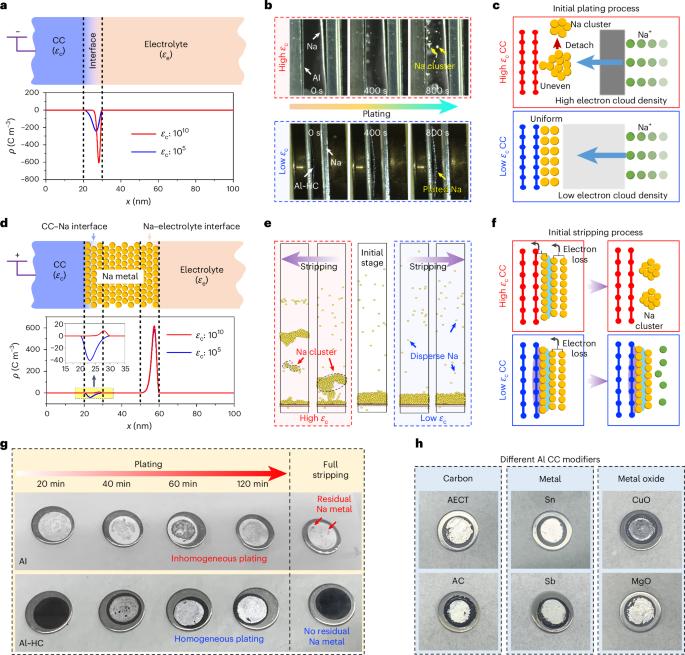高能稳定无阳极钠电池集流介相设计
IF 27.1
1区 环境科学与生态学
Q1 ENVIRONMENTAL SCIENCES
引用次数: 0
摘要
钠离子电池已成为最有前途的下一代储能系统之一。然而,硬碳阳极的低能量密度和高成本阻碍了它们的广泛应用。无阳极设计提供了一种潜在的解决方案,但由于不受控制的镀钠和低效的剥离,通常存在循环性能差的问题。在这里,我们报告了一种硬碳衍生的铝集流间相,用于构建无阳极钠电池(ALSB),该电池保持高能量密度,降低成本并提高循环稳定性。值得注意的是,具有低介电常数和强Na相互作用的界面层可以实现均匀的Na成核,无裂纹电镀和高效剥离,从而最大限度地减少循环过程中的活性Na损失。因此,我们的ALSB在长达900次循环中保持良好的稳定性,2.3 ah级ALSB的能量密度为203 Wh kg−1。我们的发现为更可持续的电池铺平了道路,这些电池具有具有竞争力的能量密度、更长的循环寿命和更低的成本。无过量钠的无阳极钠金属电池能量密度高,成本低,但循环稳定性差。在这里,一个优化的电流收集器间相实现了前所未有的循环性和能量密度。本文章由计算机程序翻译,如有差异,请以英文原文为准。

Current collector interphase design for high-energy and stable anode-less sodium batteries
Sodium-ion batteries have emerged as one of the most promising next-generation energy storage systems. However, their widespread application is hindered by the low energy density and high cost of hard carbon anodes. Anode-free designs offer a potential solution but typically suffer from poor cycling performance due to uncontrolled Na plating and inefficient stripping. Here we report a hard-carbon-derived interphase on an aluminium current collector to construct an anode-less sodium battery (ALSB) that maintains high energy density, reduces costs and enhances cycling stability. Remarkably, the interphase layer with a low dielectric constant and strong Na interaction enables homogeneous Na nucleation, crack-free plating and efficient stripping, thereby minimizing active Na loss during cycling. As a result, our ALSB maintains good stability for up to 900 cycles and 2.3-Ah-level ALSBs show an energy density of 203 Wh kg−1. Our findings pave the way for more sustainable batteries with competitive energy density, extended cycle life and lower costs. Anode-free sodium metal batteries without excess sodium achieve high energy density and low cost, but their cycling stability remains poor. Here an optimized current collector interphase enables unprecedented cyclability and energy density.
求助全文
通过发布文献求助,成功后即可免费获取论文全文。
去求助
来源期刊

Nature Sustainability
Energy-Renewable Energy, Sustainability and the Environment
CiteScore
41.90
自引率
1.10%
发文量
159
期刊介绍:
Nature Sustainability aims to facilitate cross-disciplinary dialogues and bring together research fields that contribute to understanding how we organize our lives in a finite world and the impacts of our actions.
Nature Sustainability will not only publish fundamental research but also significant investigations into policies and solutions for ensuring human well-being now and in the future.Its ultimate goal is to address the greatest challenges of our time.
 求助内容:
求助内容: 应助结果提醒方式:
应助结果提醒方式:


